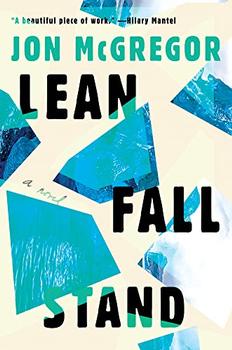Summary | Excerpt | Reviews | Beyond the book | Read-Alikes | Genres & Themes | Author Bio

A Novel
by Jon McGregorRobert "Doc" Wright has spent most of his working life at Station K in Antarctica as the "general technical assistant," an expedition guide and safety expert for the post's many scientific visitors. This time out, he shares the "iron blood"-colored hut of Station K with two young post-doc researchers, Thomas and Luke, tasked with updating GPS mapping. Once their work is complete with days to spare, the trio trek out to indulge Thomas's photography hobby. One bad decision, however, will have irrevocable consequences.
Lean Fall Stand is a linguistically spare and experimental novel that intrepidly embodies the mind and senses of a man suffering a massive stroke and its aftereffects. Author Jon McGregor focuses on a different character in each of the novel's three parts, providing a 360-degree portrait of a person with aphasia (a language disorder, see Beyond the Book) and his caregivers. In the first portion of the book, "Lean," what happens out on the ice to Doc, Thomas and Luke is presented in a quilt-like mélange of each man's memories of their first days at Station K, bracketed between their frantic efforts to locate one another after a fast-moving, freak storm roars down around them.
Doc, who ill-advisedly separates himself from the two neophytes to provide perspective for one of Thomas's photos, struggles to locate them before "something sharp" strikes him on the back of the neck, knocking him out. Regaining consciousness back outside the hut, Doc doesn't know how he got there — he only knows his right leg isn't working properly and his thoughts don't make sense. Inside, he drags himself to the radio to try to contact the others. Little does he know that Thomas has been cast adrift on an ice floe, with no satellite phone to fix his position for Doc and Luke. The situation goes from bad to worse as the massive stroke Doc suffers impacts his ability to think and speak clearly. Thomas, cold and alone, hears Doc's faint, befuddled voice on the radio: "Stand by for a brief quickening…Situation upstate."
In "Fall," Doc's wife Anna flies urgently to the Santiago hospital where he is being treated. Through Anna's eyes, the reader comes to know Robert, a man quite different from the "Doc" of Antarctica. For Anna, Robert is the man gone for several months every year, sometimes all year, working for the Antarctic Research Institute with a passion missing from his marriage and his parenting. Once Robert is flown back to Cambridge, England, Anna's career as a prominent climate scientist is put on indefinite hold as she becomes the sole caregiver to her recovering husband. Tasked with Robert's physical care and responsible for his speech therapy, Anna somehow navigates the upending of her life: The man who was never there is now there all the time, and Anna must "lock herself in the bathroom sometimes, just for privacy." McGregor reveals the thankless nature of a full-time caregiver's work, but Anna's actions are all the reader is shown. She is dutiful, distant and tired in her new role, mutely submissive. It is not clear if McGregor's unsympathetic and shallow portrayal of Anna is intentional, but the effect is the same.
In "Stand," Robert and Anna attend a weekly speech therapy group with other stroke survivors led by Amira, a young and creative speech-language therapist. She is caring and comfortable around people with severe speech issues who often make little sense and swear frequently. For example, Robert constantly blurts out "Yes, yes!," "Christ!" or "Obviously, of course!" In her therapy group, Amira recognizes that spoken instruction is no help for many suffering with aphasia; one patient, for instance, "needed to feel his body doing a movement before he was able to repeat it." McGregor did extensive research into stroke and aphasia by attending a self-help group for many months, the fruits of which are these long chapters of the rehab grind.
There are many harrowing moments in Lean Fall Stand, and McGregor is innovative in his depiction of the internal monologue of a person suffering a massive stroke, mixing up words in a cruel creative cocktail. The events at Station K during the storm are a mystery to the Institute and the friends and families of those impacted; Robert's stroke obscures the search for answers, adding tragedy upon tragedy in a way that defies a tidy resolution. One slight quibble is the flat depiction of Anna. Perhaps it is an emotional incuriousness on McGregor's part that bedevils this part of the story, as the reader comes away with a two-dimensional picture of a supremely joyless woman. Otherwise, Lean Fall Stand is a groundbreaking journey into the ways words can bind up, break apart or fail entirely, and how human beings will always find a way to be heard.
![]() This review was originally published in The BookBrowse Review in October 2021, and has been updated for the
September 2022 edition.
Click here to go to this issue.
This review was originally published in The BookBrowse Review in October 2021, and has been updated for the
September 2022 edition.
Click here to go to this issue.

If you liked Lean Fall Stand, try these:

by Allison Pataki
Published 2019
A deeply moving memoir about a young couple whose lives were changed in the blink of an eye, and the love that helped them rewrite their future.

by Porochista Khakpour
Published 2018
A powerful, beautifully rendered memoir of chronic illness, misdiagnosis, addiction, and the myth of full recovery.
The secret of freedom lies in educating people, whereas the secret of tyranny is in keeping them ignorant
Click Here to find out who said this, as well as discovering other famous literary quotes!
Your guide toexceptional books
BookBrowse seeks out and recommends the best in contemporary fiction and nonfiction—books that not only engage and entertain but also deepen our understanding of ourselves and the world around us.